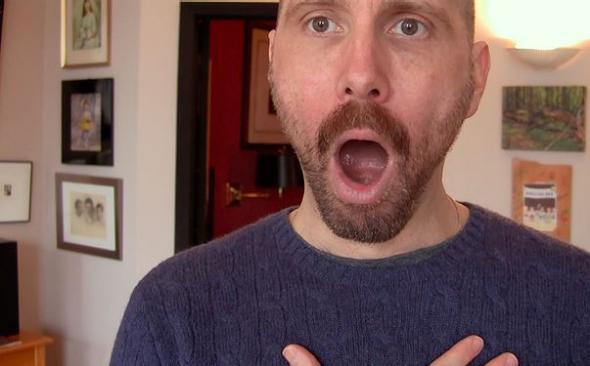A home video of me exists, stashed somewhere in my parents’ collection of family memorabilia, in which I recite a portion of the Christmas story in front of our church. I am dressed as a shepherd. I gesticulate reverently toward the manger. I declaim my lines with confidence and grace and good God almighty, do I sound gay.
There was a point in my life when I would cringe at recordings like this, finding my slippery S’s and skip-to-my-loo enunciation (which, as is true for many gay men, persisted even after speech therapy as a kindergartener) somehow embarrassing. I was gay, sure, but did everyone need to know it as soon as I said hel-ooo? This self-consciousness has faded as I’ve moved through my 20s, to the point that when I hear myself now—say, on Outward’s new podcast pilot—I actually kind of dig my voice. But plenty of gay men still shudder at the sounds coming out of their mouths, and one in particular—journalist David Thorpe—decided to make a documentary about it.
In Do I Sound Gay? Thorpe embarks on an admirable, if somewhat quixotic, attempt to both explain the “gay voice” and to assuage his own feelings of discomfort with it. The project ultimately asks more questions than it answers, but they are interesting ones to ponder, especially in the entertaining company of the “experts”—David Sedaris, Dan Savage, George Takei, Don Lemon, and Tim Gunn, not to mention a handful of speech pathologists and life coach types—that Thorpe has gathered for the occasion.
One of the more striking proposals, for instance, is that the stereotypical gay voice is a kind of drag that some gay men put on, however unconsciously, as a way of distinguishing themselves and signaling their identity to other gay men. Thorpe is particularly taken with this idea, as his family and close friends do not recall him sounding gay before he came out. It’s a compelling and plausible theory—but only in some cases. After all, I sounded gay well before I even began questioning my sexuality, and I overhear young boys in the street all the time who I am sure will be at the Pride parade within a decade or so. Ultimately, the question of “where” the gay voice comes from is probably overdetermined—that is, a result of too many comingling factors, both biological and cultural, to ever be truly sorted out.
What’s more interesting is how gay men and the larger society in which we live deal with public manifestations of gayness, like voice or mannerisms. Thorpe smartly spends time on the issue of why some gay men recoil from “effeminate”-sounding queens, both socially and in the bedroom—a very real dynamic which, of course, comes down to base misogyny. As Dan Savage points out in the film, many gay men are terrified of being seen as women by the larger culture, and so they predictably bristle at anything that smacks of the feminine. There’s an irony in this, though, because another origin theory has the voice arising from many gay men’s proximity to women during childhood: Straight women, typically, have been our allies, and so it makes sense that we might pick up certain aspects of their speech.
Thorpe also glances at the issue of gay representation over time, which figures the “nancy,” “pansy,” and “queen” as having an air of (often villainous) superiority. There’s a kind of power, however diluted, in haughtiness—perhaps imitating Oscar Wilde or Quentin Crisp is a reasonable way of accessing it. Thorpe runs into trouble here, however, because he conflates a purely sonic phenomenon with a larger mode of comportment. There’s nothing inherently camp about a lisp, for example; queenliness or campiness only arise when body language, slang, wit, and a range of other resources are deployed in concert.
In the end, Do I Sound Gay? is better at outlining a fascinating problem than at offering a satisfying solution, and the film is often freighted with too much of Thorpe’s own idiosyncratic neuroses—some of which the viewer probably needs to share to find his personal meditations more than moderately intriguing. But if the movie helps some gay men sort out this particularly insidious and lingering form of internalized homophobia, I’m all for it. The sooner we get to a world where the question “Do I sound gay?” is answered with a shrugging “yes … and?” the better.
Do I Sound Gay? is currently playing in New York and on all Cable-On-Demand platforms. It will open in other cities in the coming weeks.
